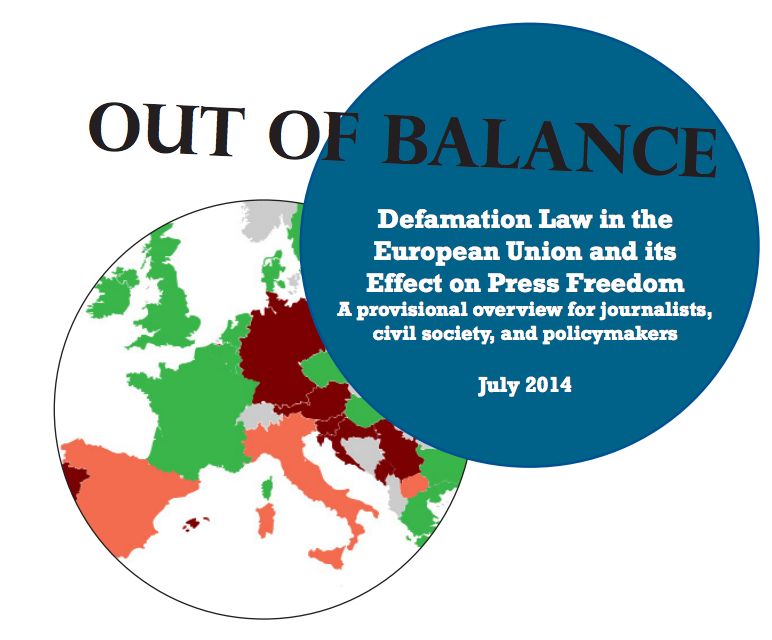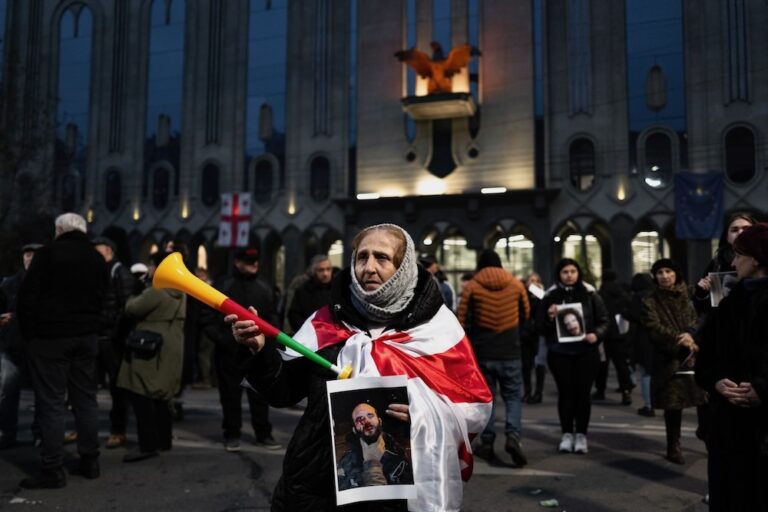According to a new report, just five out of 28 EU member states have repealed general criminal defamation and insult laws, despite broad international consensus among legal experts and press freedom advocates that criminal punishments for defamation represent a disproportionate restriction on free expression.
An International Press Institute (IPI) report on defamation law in the European Union (EU) indicates that EU member states fall dramatically short of fulfilling relevant international standards on freedom of expression, with the vast majority maintaining criminal defamation provisions that threaten the media’s ability to report on matters in the public interest.
According to “Out of Balance”, the report released today, just five out of 28 EU member states have repealed general criminal defamation and insult laws, despite broad international consensus among legal experts and press freedom advocates that criminal punishments for defamation represent a disproportionate restriction on free expression.
Moreover, the report reveals that the laws of 20 EU member states contemplate imprisonment as a punishment for defamation or insult, contradicting European Court of Human Rights (ECtHR) rulings that imprisonment is, as a general rule, never an appropriate punishment for defamation. Fifteen states set maximum prison terms of at least two years, with the highest potential prison term in the EU coming in Slovakia, where those convicted can face up to eight years behind bars.
Similarly, although international standards recommend against providing public officials with any special protection under defamation law, the laws of six EU states elevate criminal punishments for defamation when the offended party is a public official or public figure. Twelve EU states maintain separate criminal provisions against insulting the head of state and a majority protect the reputation of “objects” such as the state, state institutions or state symbols.
The report is based on IPI’s preliminary analysis of data collected by IPI and several research partners. Conducted using a common methodology to examine the existence of legal provisions related to defamation law and practice in the 28 EU member states and in five of the six current EU candidate countries (Albania, which achieved official candidate status last month, is not yet included), the research allows for a comparison of defamation law among EU countries and highlights discrepancies between EU defamation laws and international standards on free expression.
The report is available for download and can also be accessed via IPI’s dedicated website, www.freemedia.at/ecpm.
Particularly troubling is the report’s suggestion that the EU’s defamation laws, their archaic nature notwithstanding, are not simply collecting dust: according to the research undertaken by IPI and its partners, in the last five years alone courts in at least 14 EU countries sentenced journalists to a criminal punishment for defamation or insult, including fines and even – in the case of Italy – jail terms.
“The results of our research should serve as a wake-up call to all concerned with press freedom in the EU,” IPI Executive Director Alison Bethel McKenzie said. “The existence and use of such outdated defamation laws, combined with a haphazard application of international standards on free expression by national courts, no doubt opens the door to a chilling effect on EU media. And this is something that all EU citizens, not just journalists, should be concerned about. When journalists are not able to carry out investigations or freely criticise those in power, the people’s right to know is threatened.”
Bethel McKenzie stressed that the EU’s defamation laws had to be seen in a global context.
“On the one hand, EU countries need to get on board with the growing number of countries that have done away with criminal defamation laws, from Ghana to Jamaica,” she said. “Even Zimbabwe’s Constitutional Court last month declared criminal defamation laws to be incompatible with freedom of expression. On the other hand, EU countries need to remember that they set an example. When the legal situation is not in order at home, it makes it more difficult to justify pressing more restrictive governments abroad for change.”
In the coming weeks, IPI plans to release additional materials highlighting the state of defamation and insult law country-by-country in EU member and candidate state. IPI will also continue to process, develop and share the trove of data collected on defamation law and practice in the EU.
Separately, IPI also released today the preliminary results of its “perceptions study” on defamation, in which journalists from across the EU were asked to assess the extent to which defamation proceedings affect their work and press freedom generally. Troublingly, 80 percent of respondents surveyed said that defamation laws had a medium or high impact on the news media in their country, and 85 percent stated that they believed such proceedings were commonly brought for an improper purpose, such as chilling free expression or interfering with journalism.
Both reports form part of, and offer support for, IPI’s broader advocacy, training and capacity-building work on defamation in the EU, supported with co-funding from the European Commission. This fall, IPI will launch a series of workshops for journalists and lawyers in selected EU member and candidate states to assist journalists in effectively defending their right to report in the public interest. These workshops will be complemented by press freedom missions designed to encourage legal reform based on international standards on free expression.



